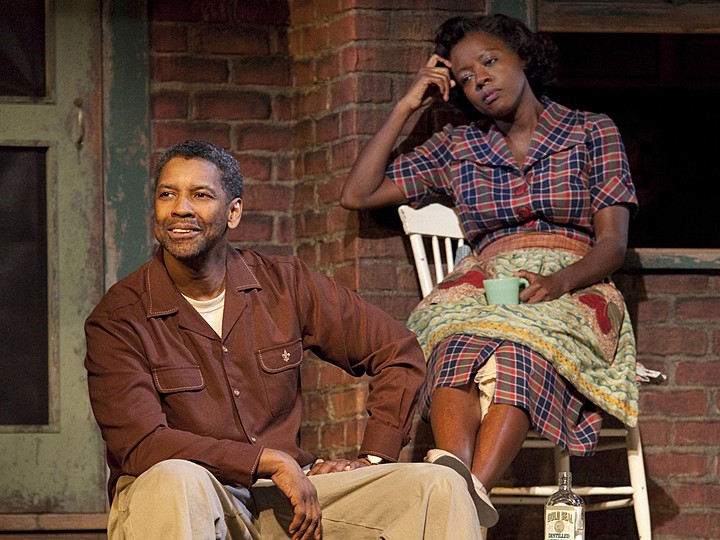By Laurie Coker
Rating: A-
A fine line exists between creating an outstanding film from a stage production – be it a musical or standard play. Many have accomplished it successfully – consider Chicago, Pygmalion (aka My Fair Lady), Barefoot in the Park, Casa Blanca and the list goes on and on. It’s more difficult, perhaps to adapt a non-musical for the film, if for no other reason than the simplicity and boundaries of the theater stage. Fences, starring Denzel Washington and Viola Davis, is demonstrative of almost every aspect done right.
Washington directs and stars in this adaptation of August Wilson’s Pulitzer Prize-winning drama that focuses on a black garbage collector named Troy Maxson in 1950s Pittsburgh. Maxson, a bitter man, is married to his devoted wife, Rose. Together they have a son, Cory (Jovan Adepo) a talented athlete, but because of Troy’s experiences as a gifted baseball play in the Negro League and the racial barrier that kept him from reaching greatness, he forbids his son from playing football. Their relationship goes from strained to worse, and as we learn more and more about him, Troy disappoints more than his son and himself.
Washington and Davis performed in a stage revival of the play in 2010 and both won Tony’s. When the film first opens Washington keeps his set tight, blocking his characters to defined points and relying on Wilson’s dialogue to drive the story. As is expected, Washington embodies Troy Maxson and his disillusioned, resentful persona, although, at times, he goes a tad too big on expressing his cynicism and personal dissatisfaction. Davis is, simply put, perfection. She is the doting, dutiful, 1950’s wife –and as the story advances, also resentful and emotionally battered. Any other actress might have paled next to Washington’s brazen, bold and passionate portrayal, but not Davis. Hers is an exceptionally moving performance – albeit more subtle.
Staying within the boundaries of the source material and its roots on the stage, Washington relies on his cast (including himself) to tell the tale. They do so with impressive, emotionally provocative performances. Primarily set in the backyard of Troy and Rose’s humble home, the relationships between Troy, his best friend, and his family unfold, peeling back the facade and revealing the emotional turmoil and tension that lie beneath the surface. Troy is nearly unbearable. He has been obviously emasculated by life and his plight as a black man in the 1950’s. He seeks to hold on to his virility by ruling over his teen son and seeking companionship outside his home.
Washington keeps Fences simple, an attractive but not flashily photographed production, one that is compactly captured, building tension and allowing for Wilson’s arguments and soliloquies to develop and fill the space. A stoop, a single baseball hanging on a rope in a tree, a fence in need of mending and the interior of the family house make up the majority of the movie’s scenes. Most of the time, Washington keeps things unassuming, focusing on key characters and their discourses, but a few times, he creates dizzying effects by circling from face to face rather than focusing on the group as a whole.
Fences is one of the best films of the year and its performances are inspiring – solid and poignant. Like stage productions, it isn’t necessarily an entertainment form with a wide appeal. Washington, however, earns a double notch for his turn as both star and director, and it demonstrates again the man’s nearly flawless, impressive talent. Fences earns an A- in my grade book. A man like Troy is both pitiable and detestable.
